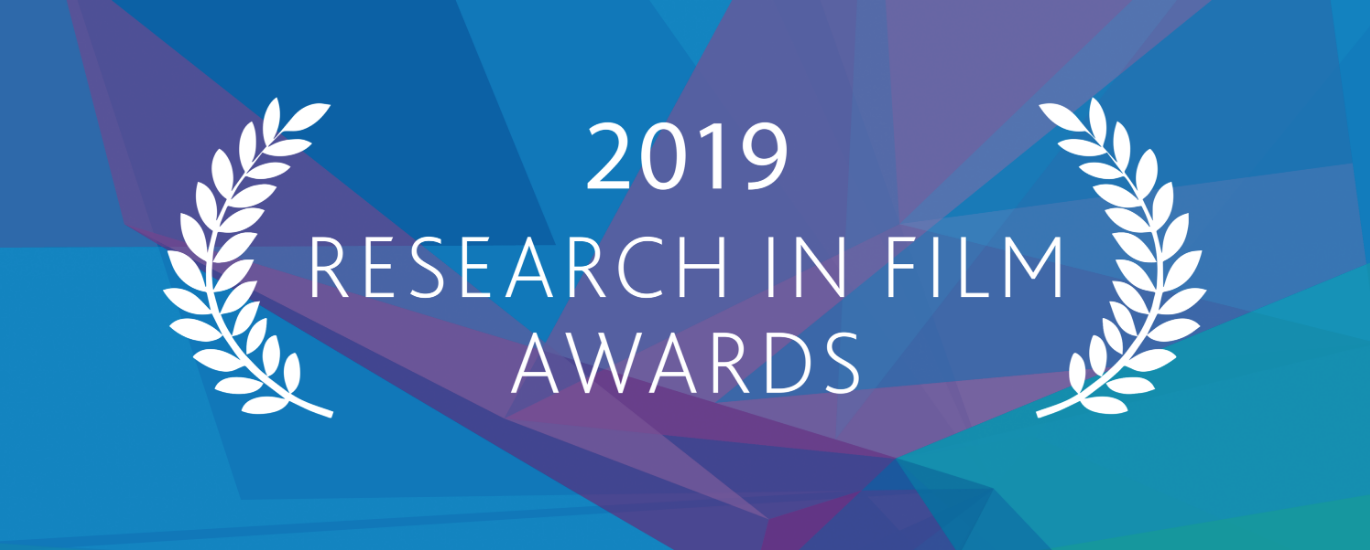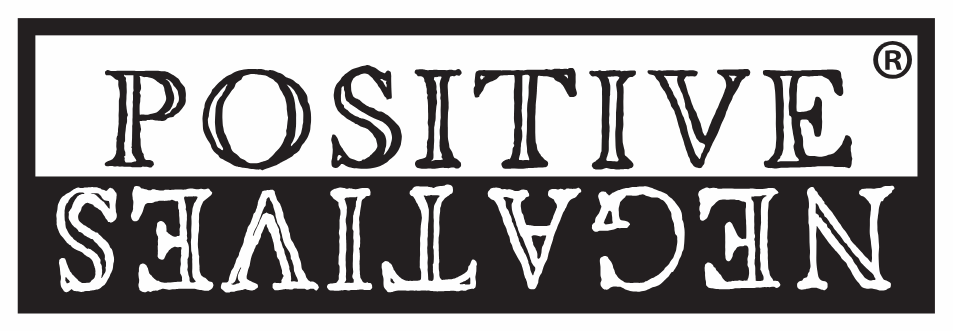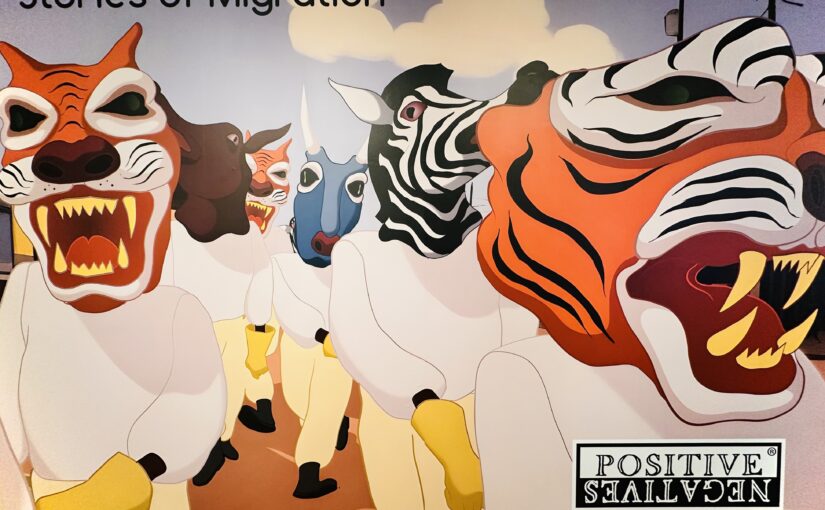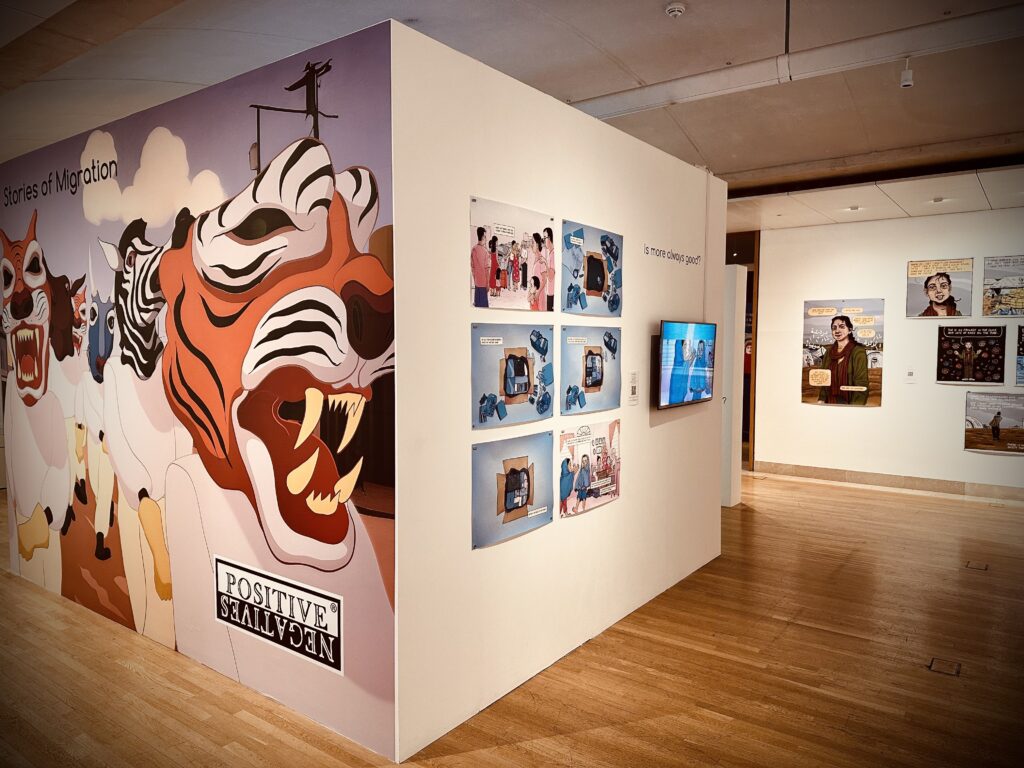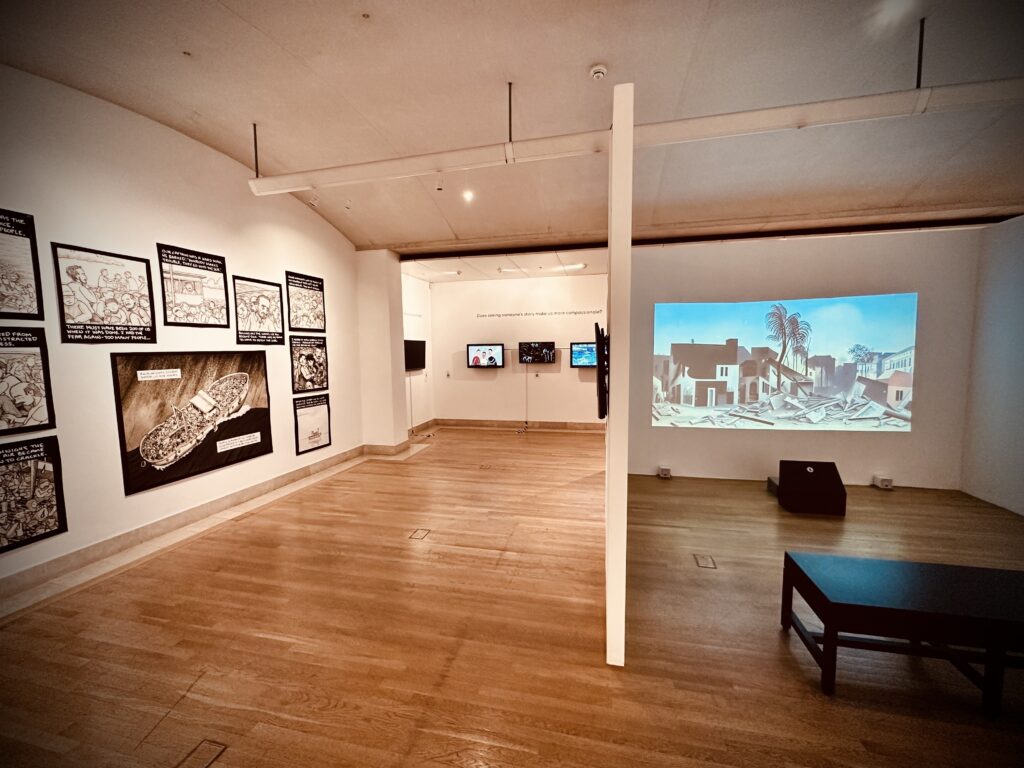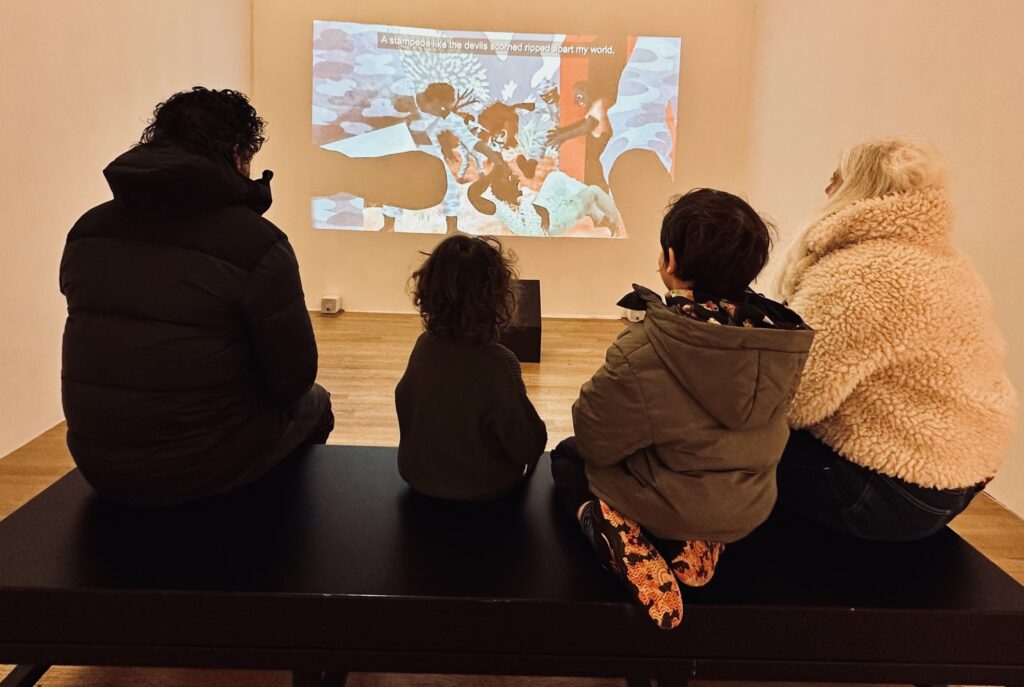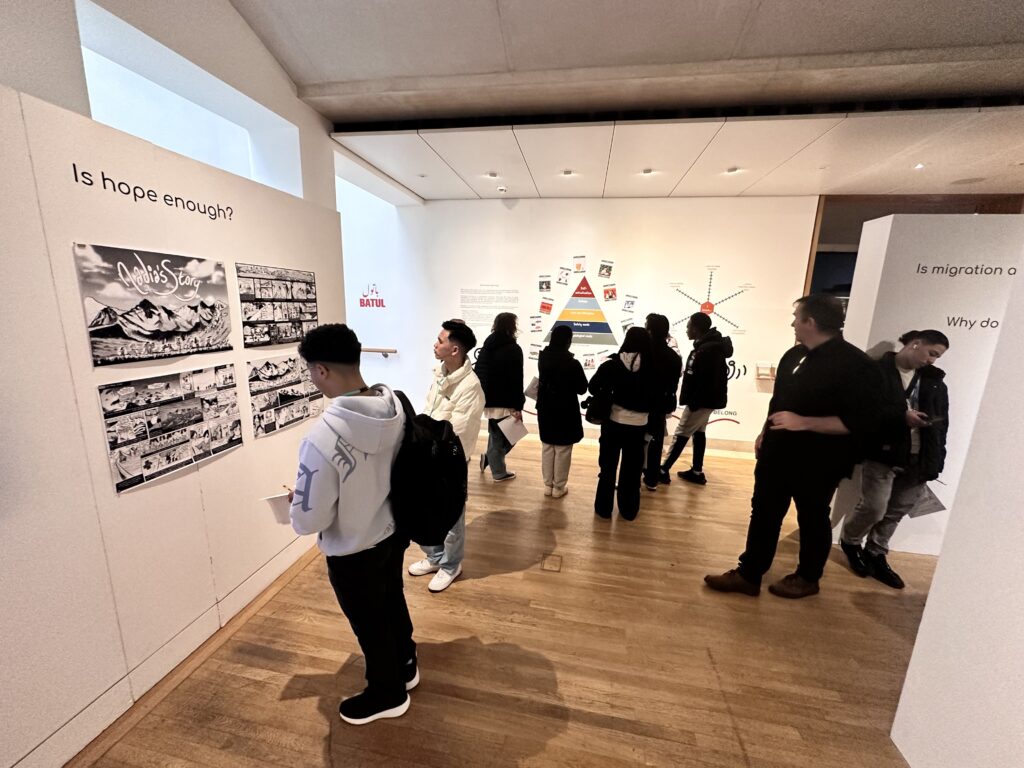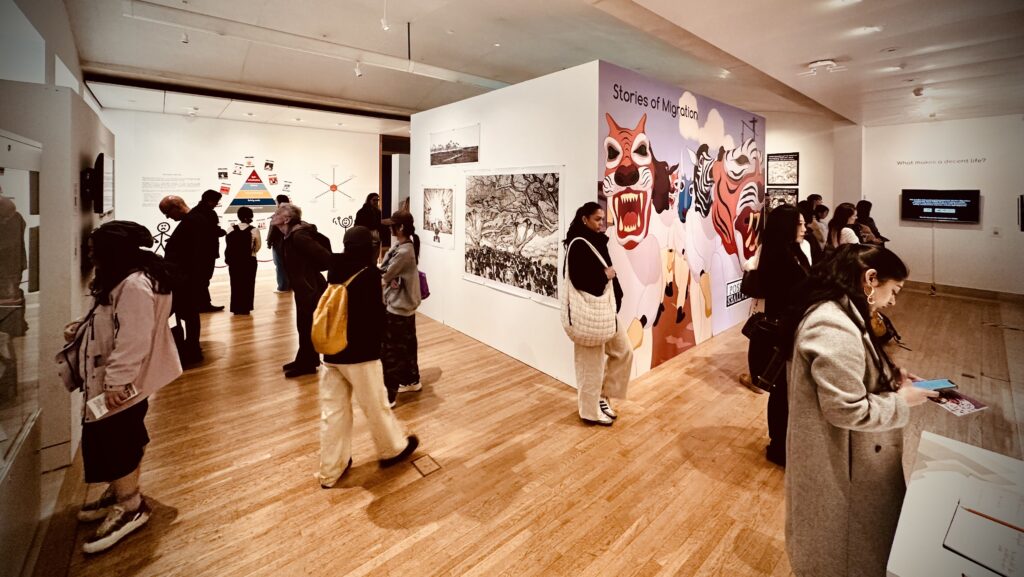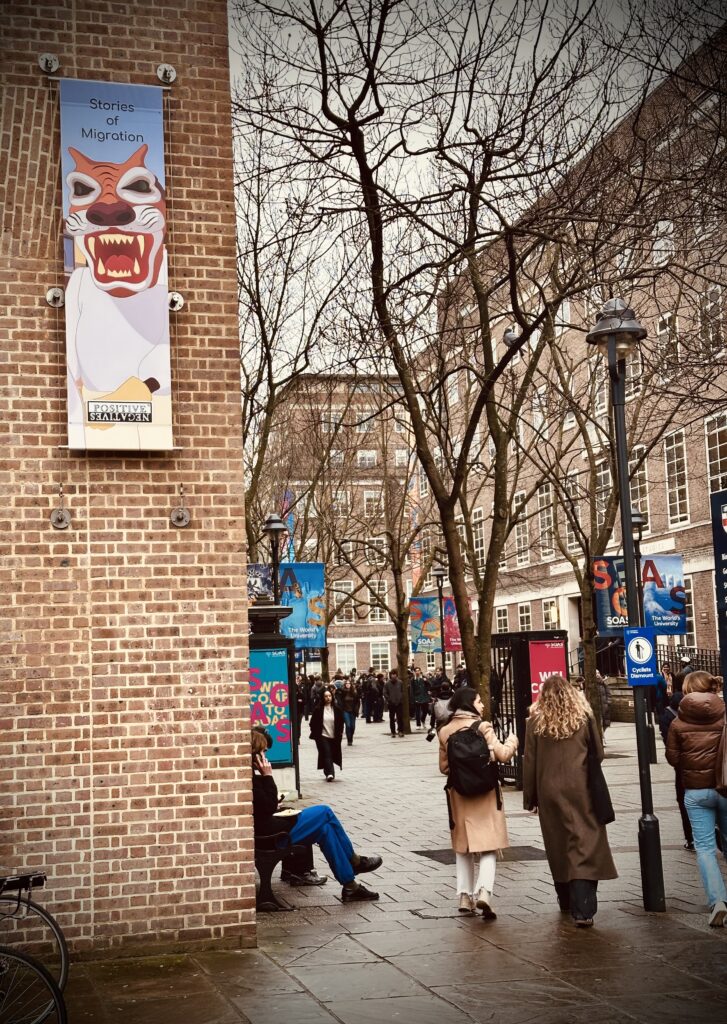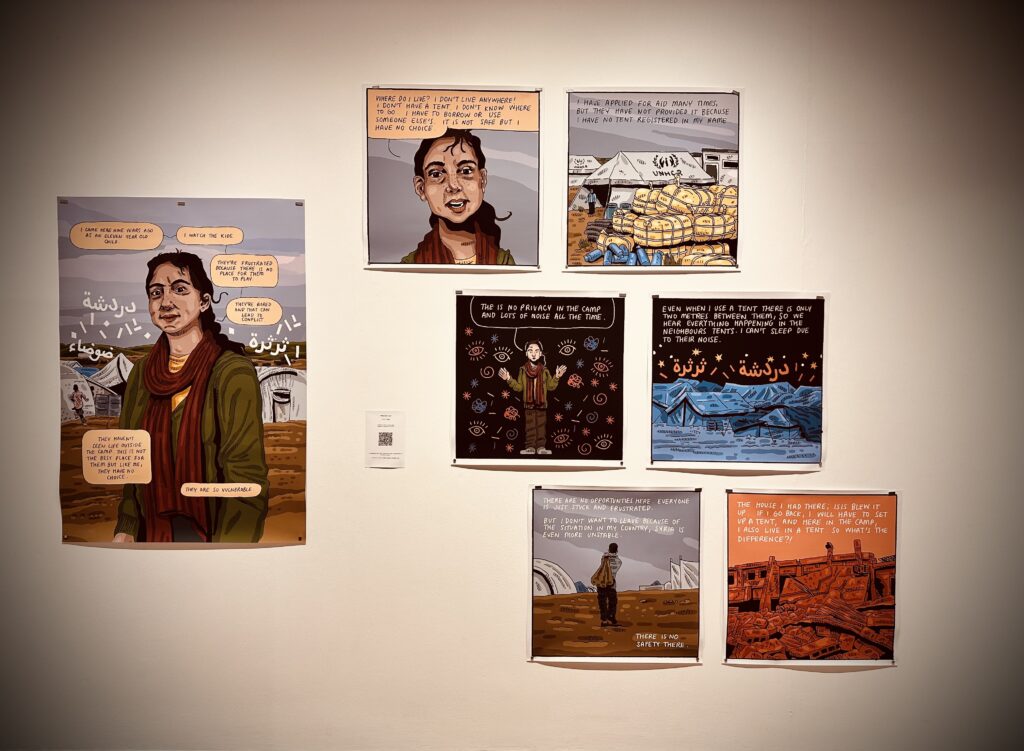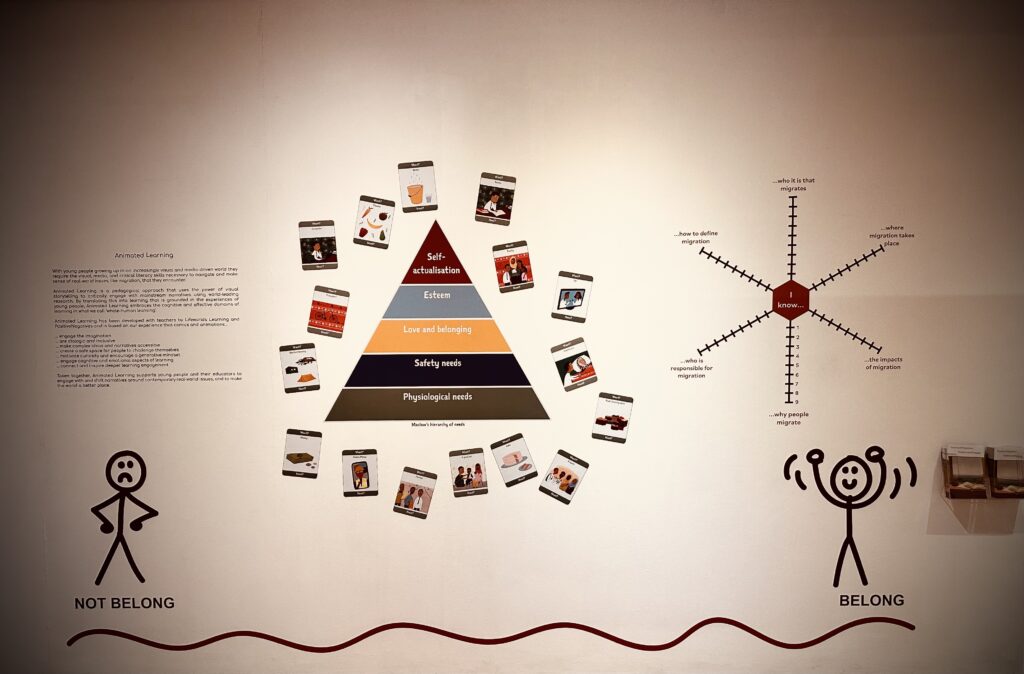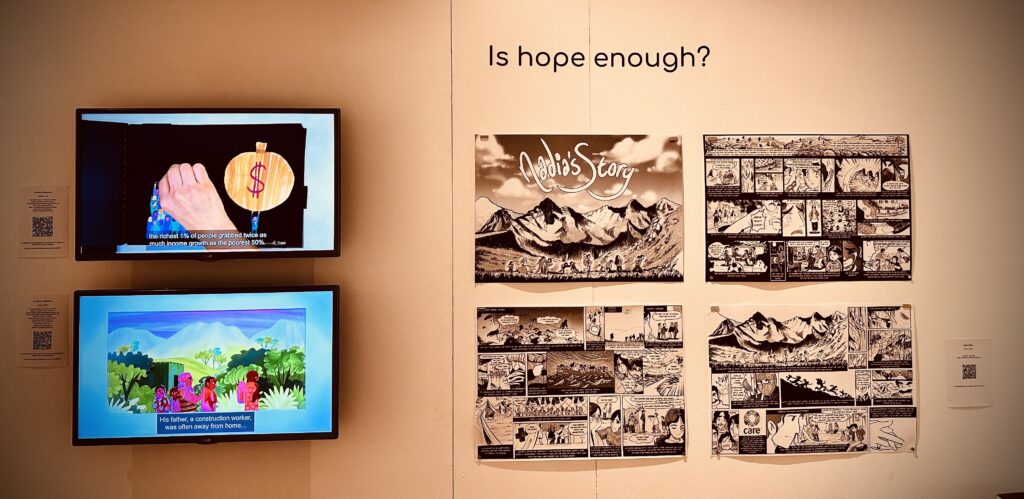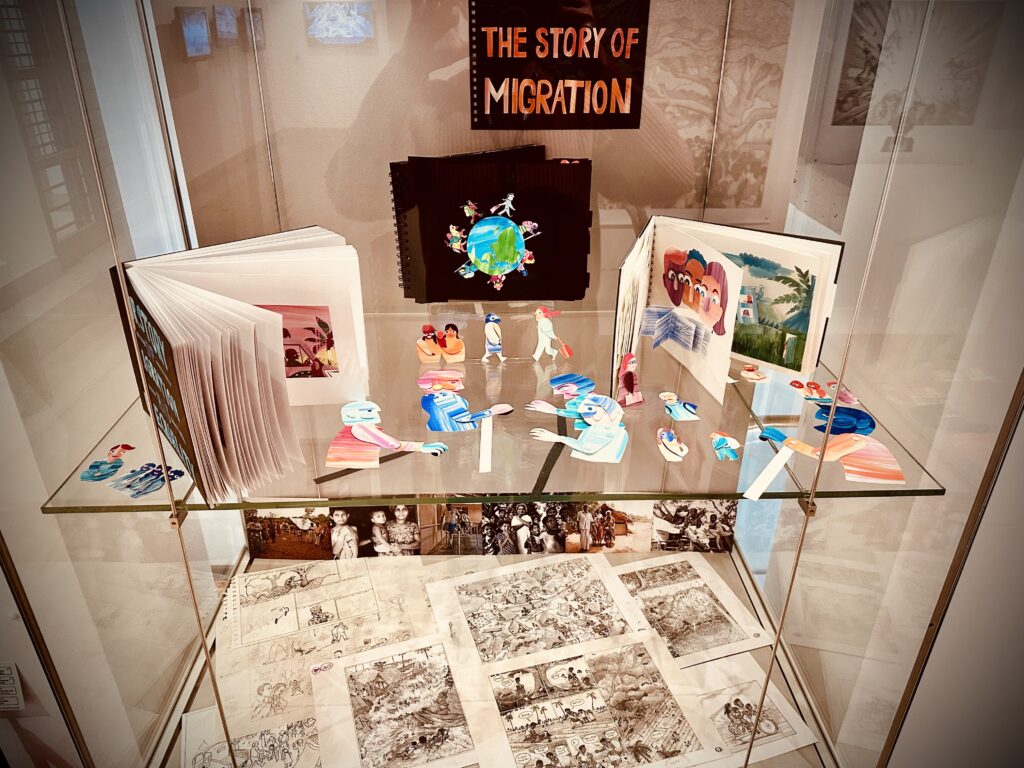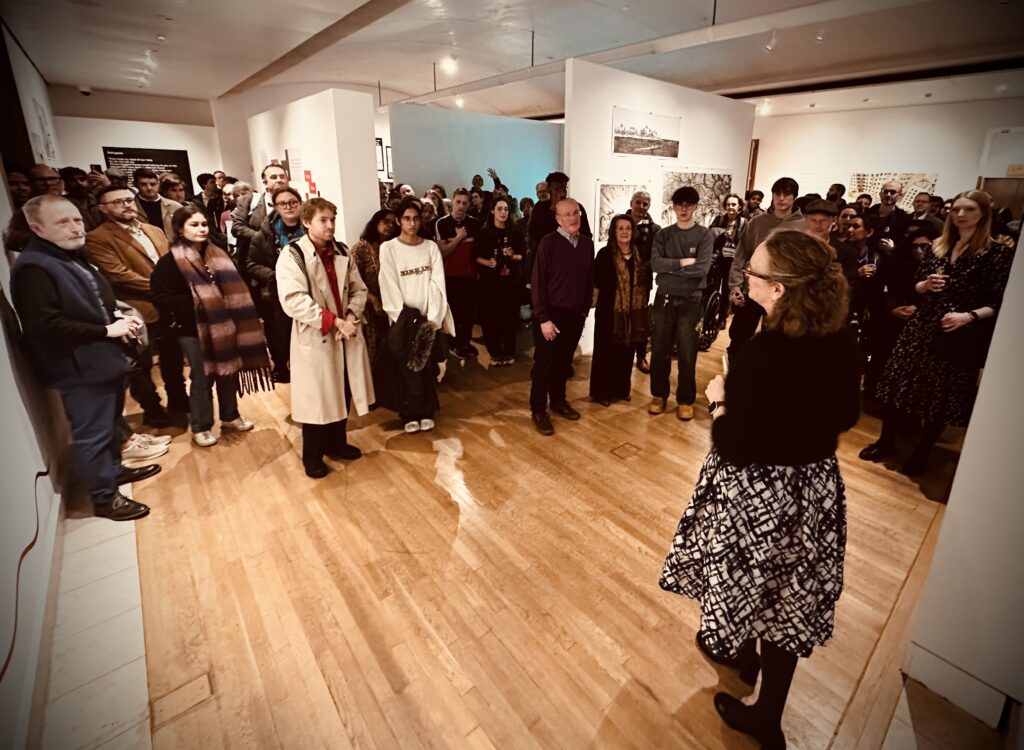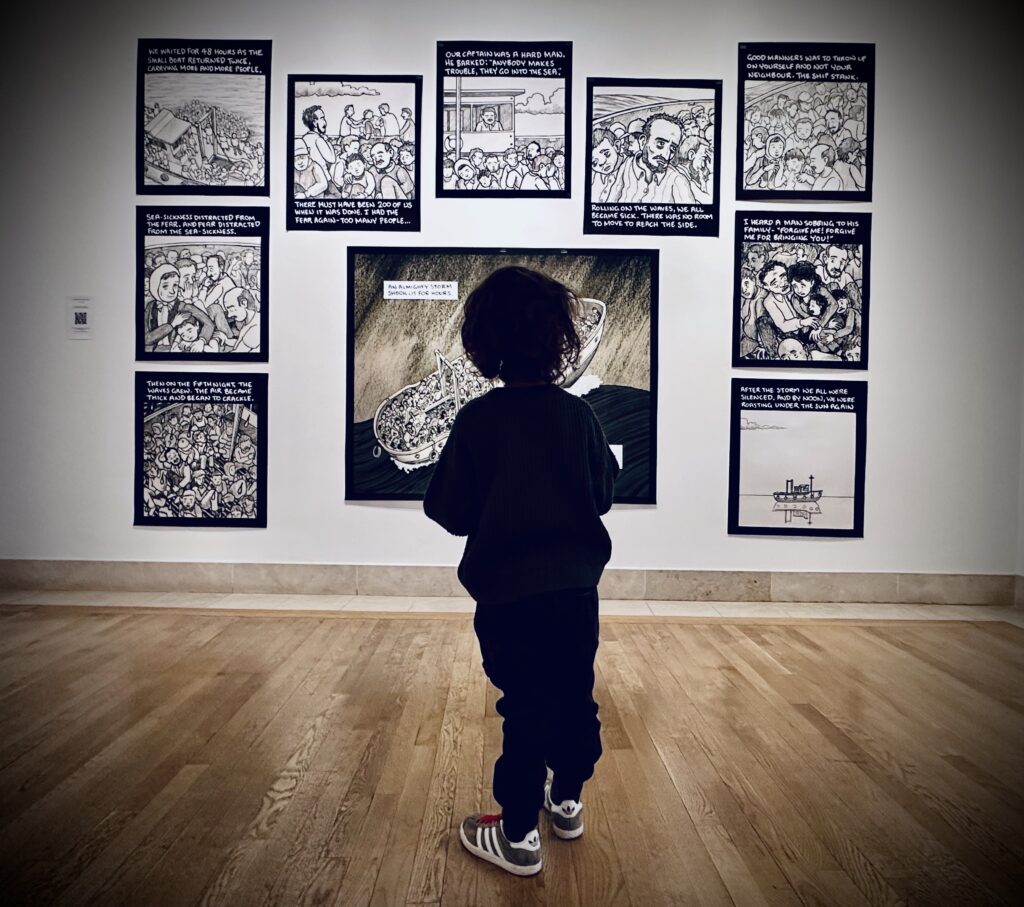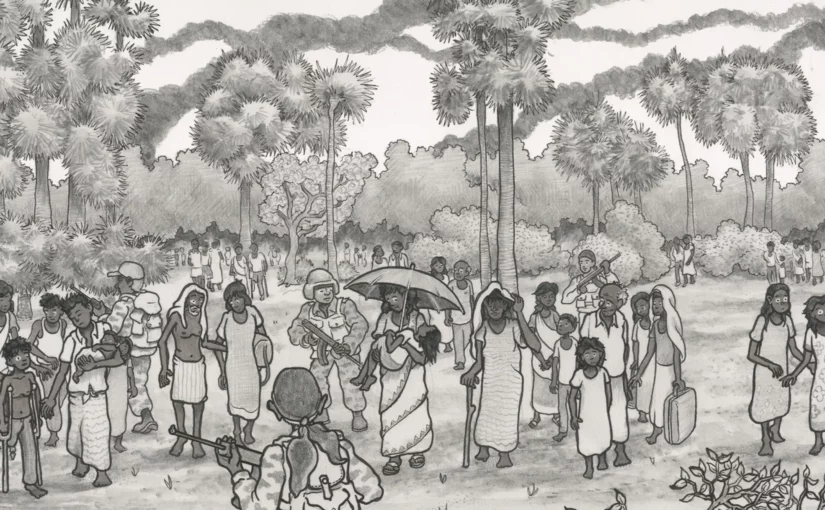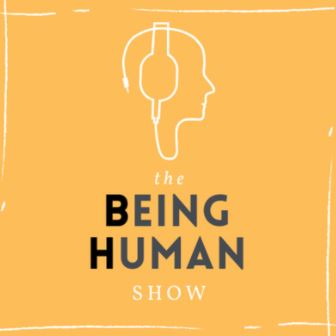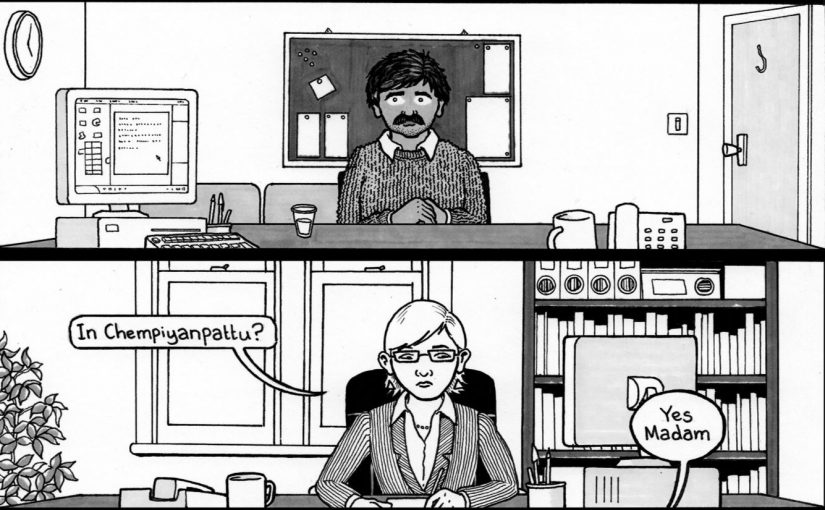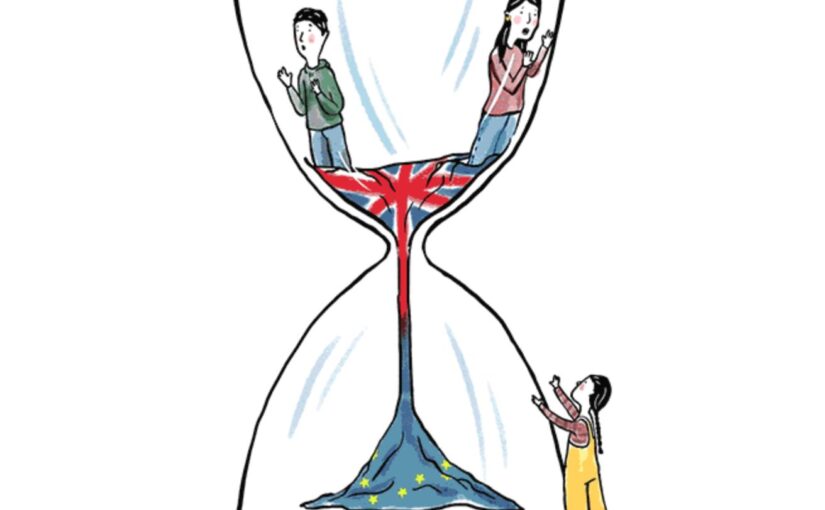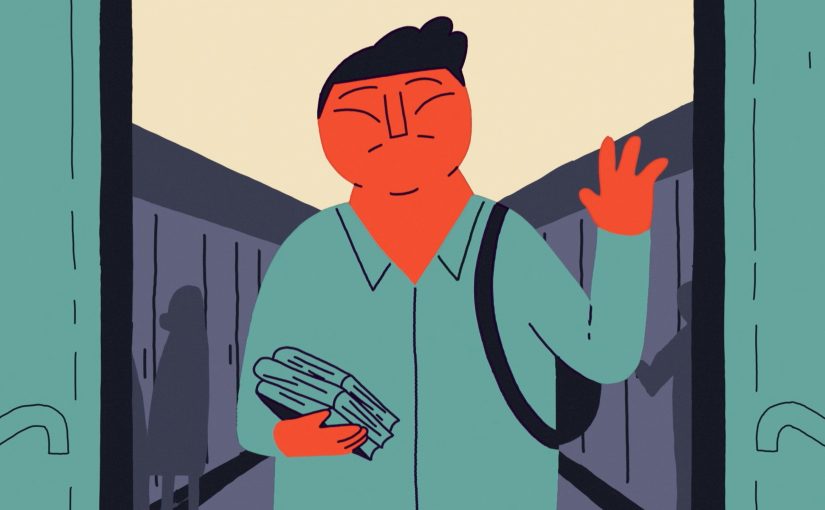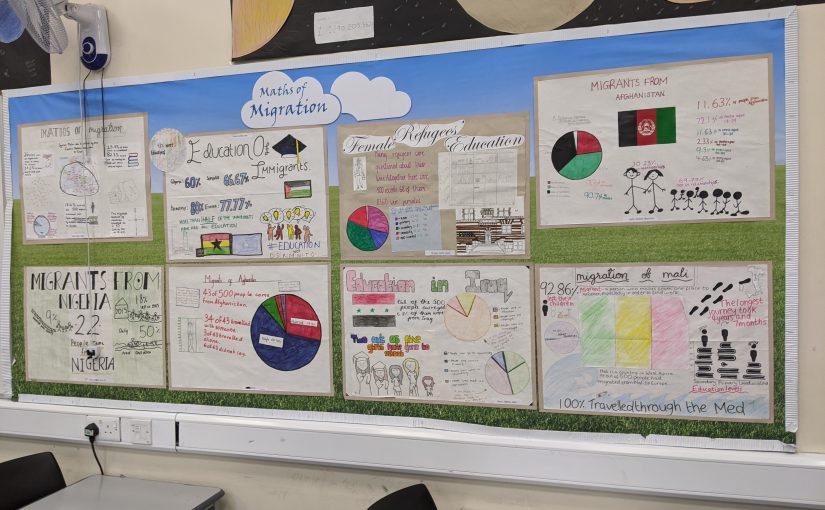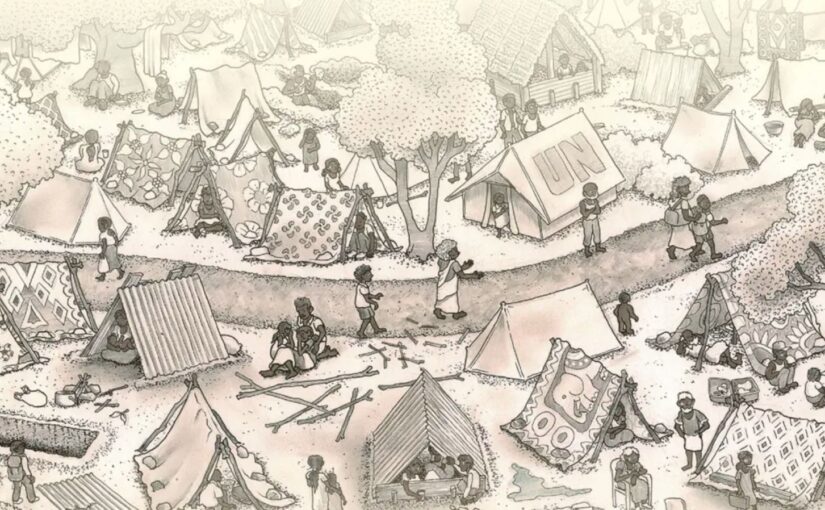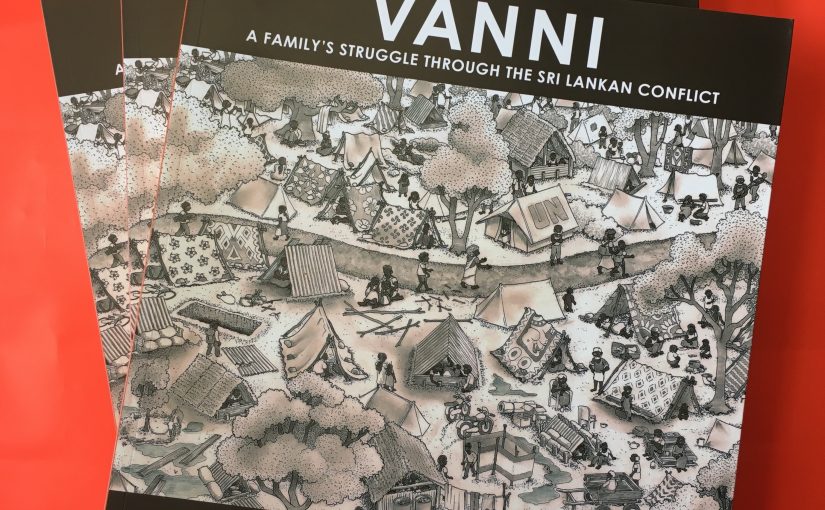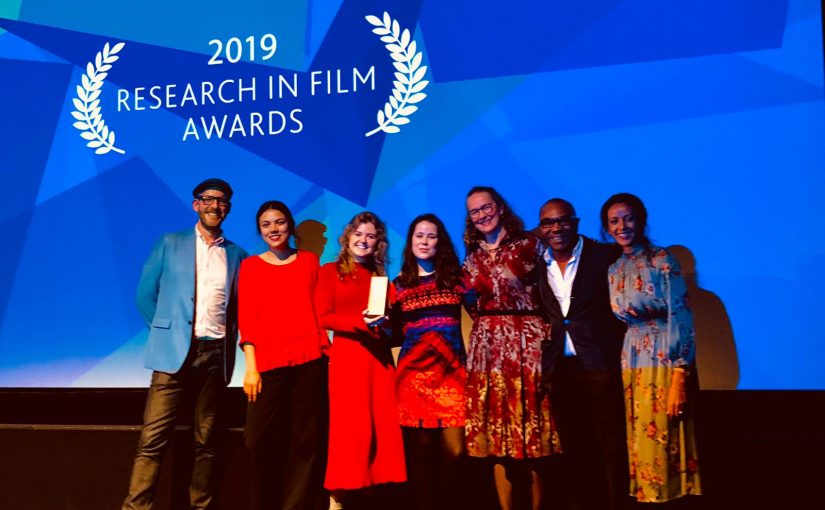Migration is often in the news, yet some voices are rarely heard: those of migrants themselves.
Stories of Migration brought their dramatic experiences and extraordinary journeys to life. The exhibition showcased the innovative storytelling of SOAS-based, not-for-profit organisation, PositiveNegatives, over the last 12 years.
Over a dozen comics and animations, illustrated by a diverse, global community of artists were exhibited. Each project was developed with leading academic institutions and humanitarian organisations. Together, the work demonstrated how visual arts can give complex research greater impact.
The power of illustration was highlighted by pulling out emotive and engaging elements from each project. It was a voyage of discovery, spanning three aspects of migration; home, the journey, and the destination. There were also glimpses behind the scenes, with archival ‘making of’ materials, featuring research photos and handcrafted illustrations.
The exhibit was peppered with questions such as: What does it mean to be equal? Is more always better? What makes a decent life? These connected to the Animated Learning section, PositiveNegatives’ new educational content, developed with Lifeworlds Learning and officially launched during the exhibition.
Stories of Migration was co-curated by Daniel Locke and Dr Benjamin Worku-Dix
Special thanks to: John Hollingworth MBE, Prof. Laura Hammond and Prof. Heaven Crawley
And thank you to everyone who generously gave their time and entrusted us with their stories over the years, which were the basis of the exhibition and PositiveNegatives.
Photographs of the exhibition at SOAS Gallery
Selected media coverage of Stories of Migration
Read all the stories exhibited on the PositiveNegatives website
- Unstoppable Beat
- The Story of Migration
- The Boy with More?
- Life on the Move + Making of film
- North Star Fading
- Dear Habib
- A Perilous Journey
- Vanni
- Nadai’s Story
- Migration Rhythms
- Into our own Hands
- An Empty Promise
- Where Do I live?
Animated Learning Workshops
Throughout the duration of the exhibition, PositiveNegatives educational initiative Animated Learning with partners Lifeworlds Learning ran workshops for 16-19 year old students and educators from schools across London.
The workshops were created in support of the Stories of Migration exhibition and explored narratives of migration and mobility, providing space for students and their educators to explore their own and others’ understanding of this highly relevant issue.
The workshops were kindly funded by the SOAS Impact Accelerator Account (IAA)
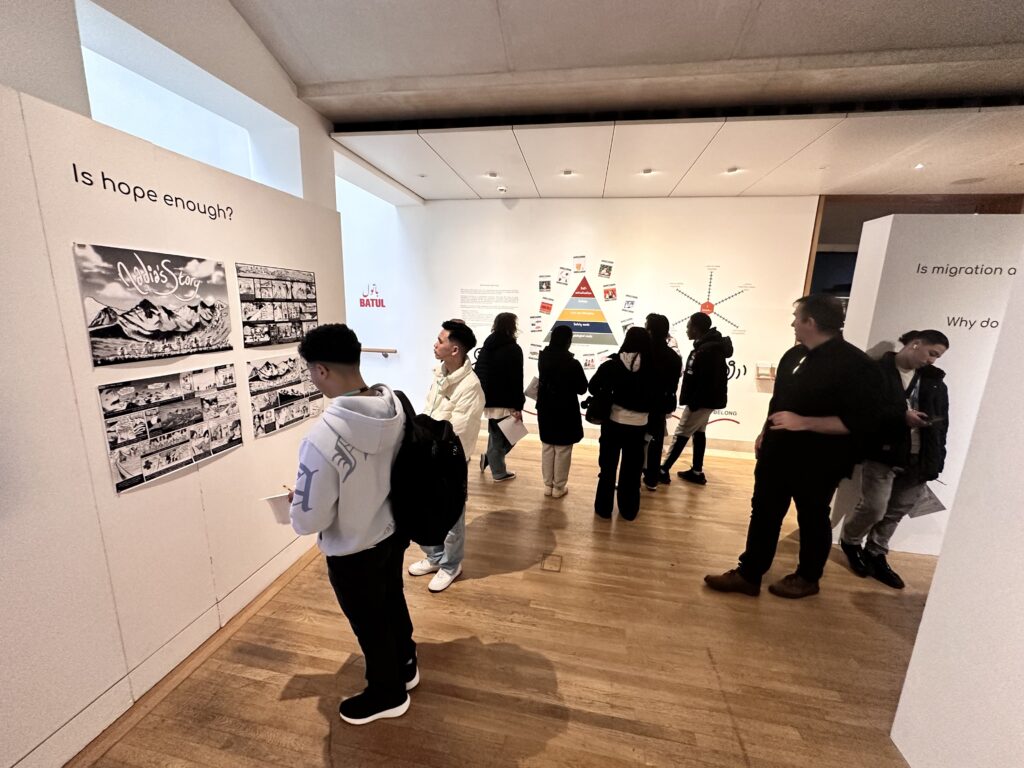
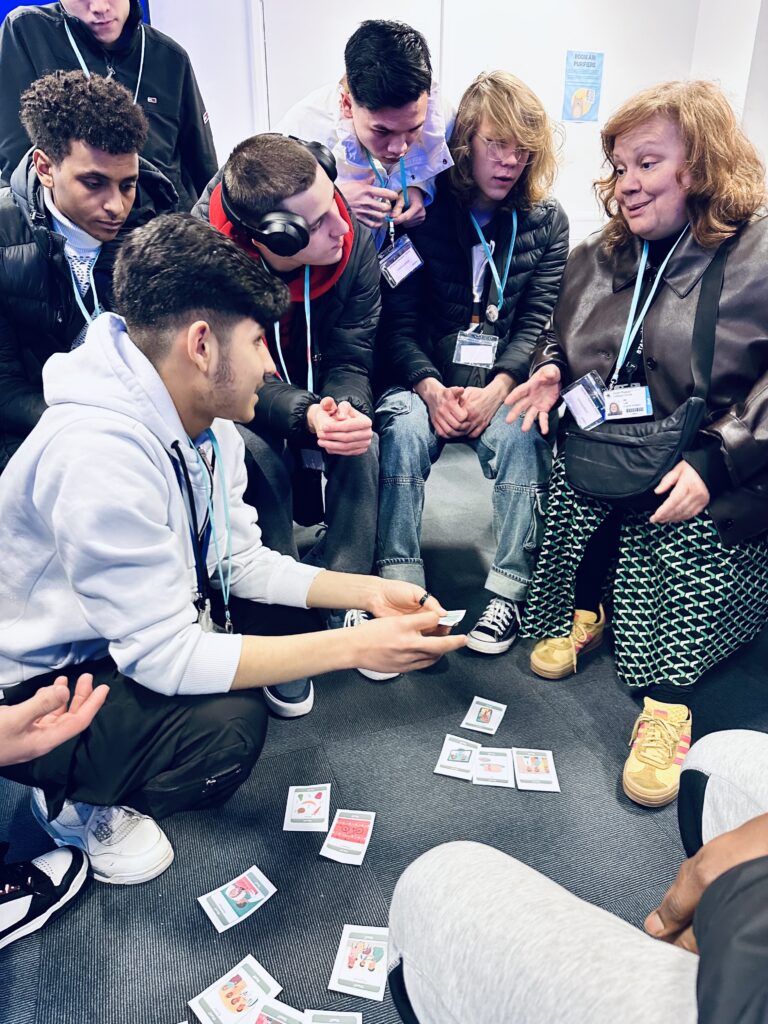
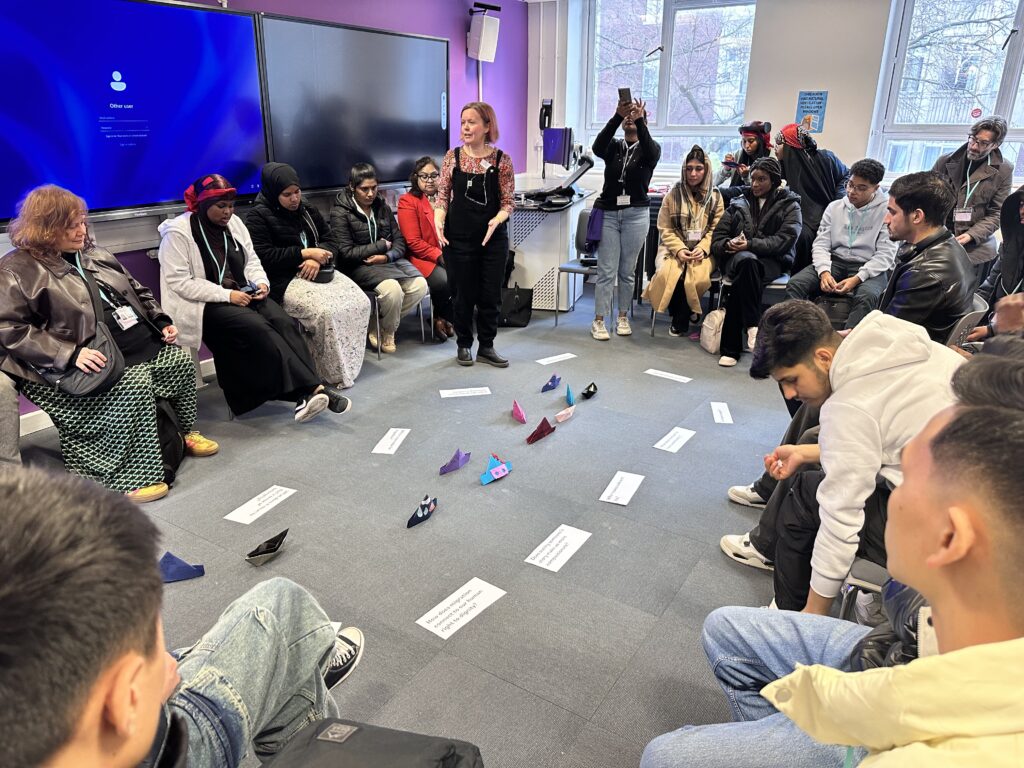
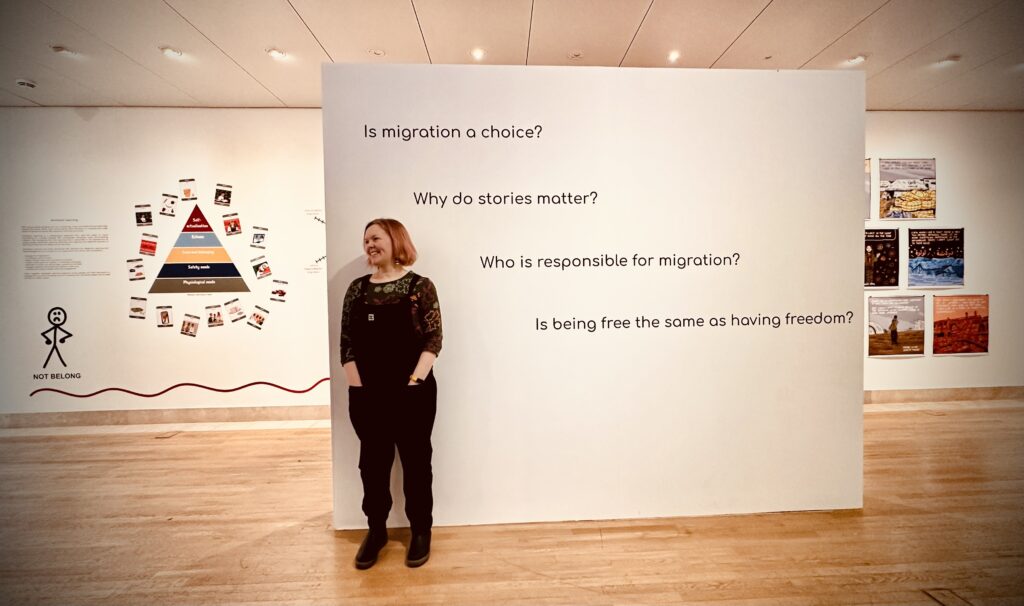
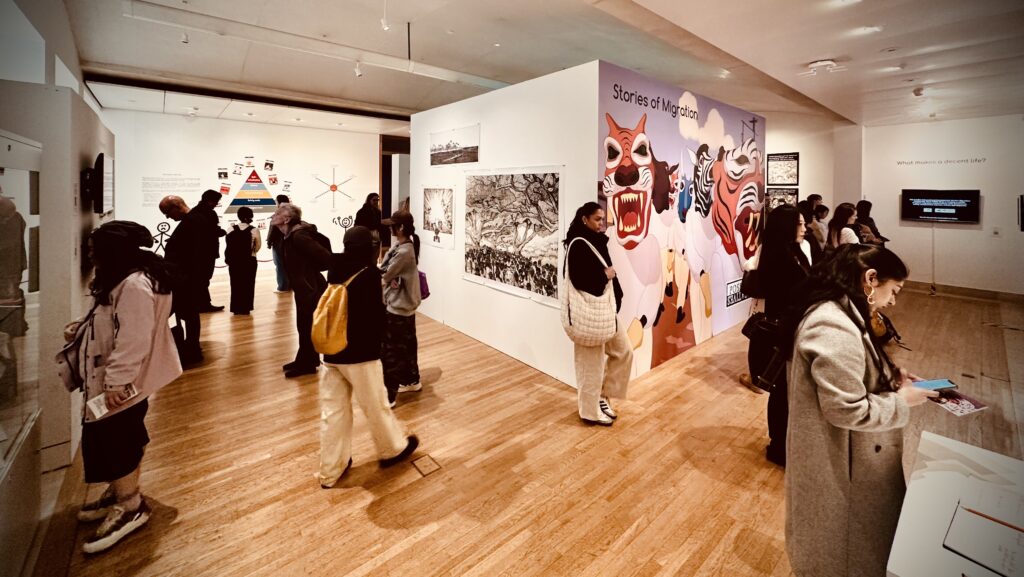
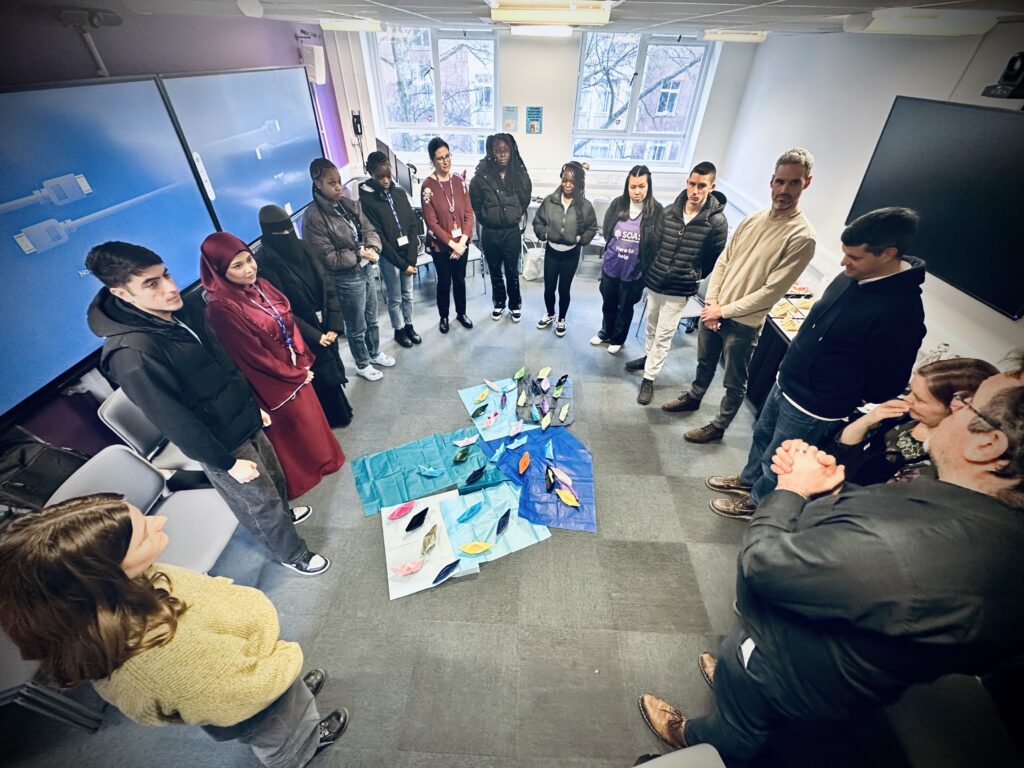
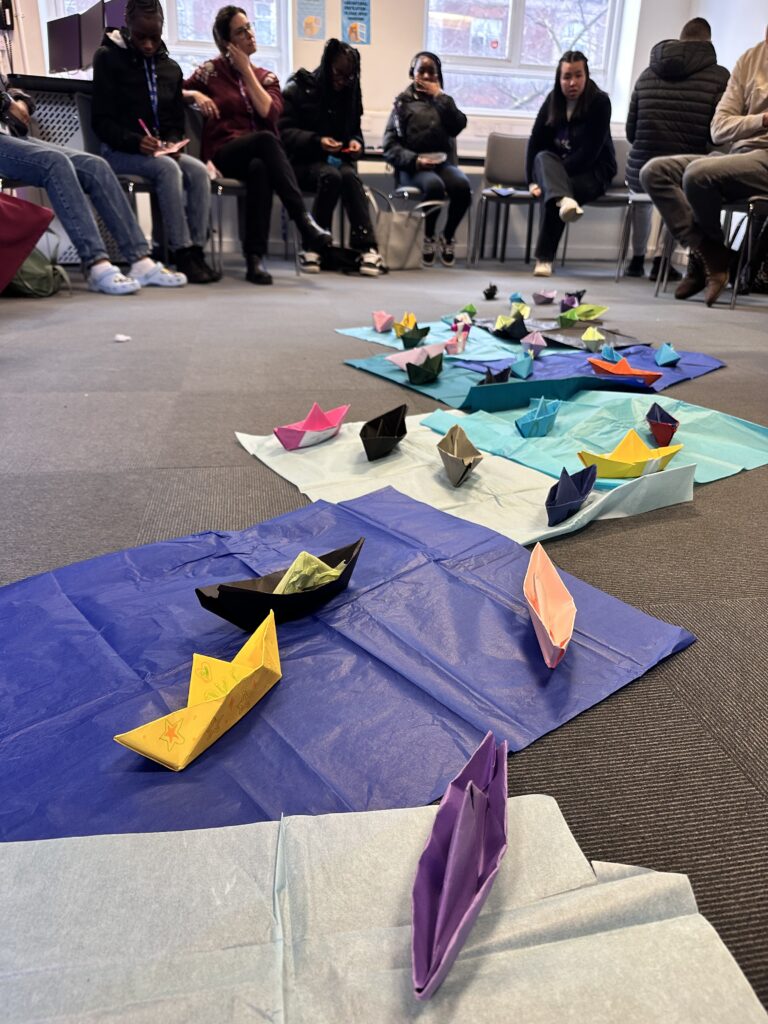
Some comments from the guest book
- Bought me close to tears. I loved the art of storytelling. Thank you
- Such a contrast from the stories portrayed in the media
- Powerful animations and interesting way to show the stories
- Brilliant work! Feeling very moved. Loved seeing the W.I.P. drawings
- Good to focus on this issue [migration] in such an accessible way
- Much needed and full of considered reflection
- Really thought-provoking. Makes you realise the untold feelings and journeys faced by migrants.
Projects within the exhibition were developed with and funded by:
SOAS University of London, University College London (UCL), University of Sussex, Coventry University, Peace Research Institute Oslo (PRIO), Overseas Development Institute (ODI), London International Development Centre (LIDC), UK Research and Innovation (UKRI), Arts and Humanities Research Council (AHRC), Economic and Social Research Council (ESRC), European Research Council (ERC), Global Challenges Research Fund (GCRF), Arts Council England (ACE), Care International, Danish Refugee Council (DRC), Norwegian People’s Aid (NPA), Nobel Peace Centre, United Nations (UN) and The Allan & Nesta Ferguson Charitable Trust
 Loading…
Loading…
 Loading...
Loading...
Current estimates suggest that 1.2 billion children across the globe are out of the classroom, as COVID 19 has prompted school closures in at least 183 countries. While educators and institutions look towards new forms of e-learning and online teaching, Positive Negatives collaborations with the Centre for Peace, Trust and Social Relations (CTPSR) at Coventry University and secondary school teachers are now producing online learning resources — ‘Voices of Migration’ — for bringing migration and refugee experiences into the classroom in a safe and constructive way.
‘Voices of Migration’ are a cross-curricular set of resources based upon critical pedagogy, a teaching practice which allows students to question and challenge dominant beliefs or narratives. Designed by specialists and tested by teachers, these free resources are an adaptable set of tools that allow students to critically engage with the realities of migration. They can be used during remote learning to develop storytelling, maths and data skills.
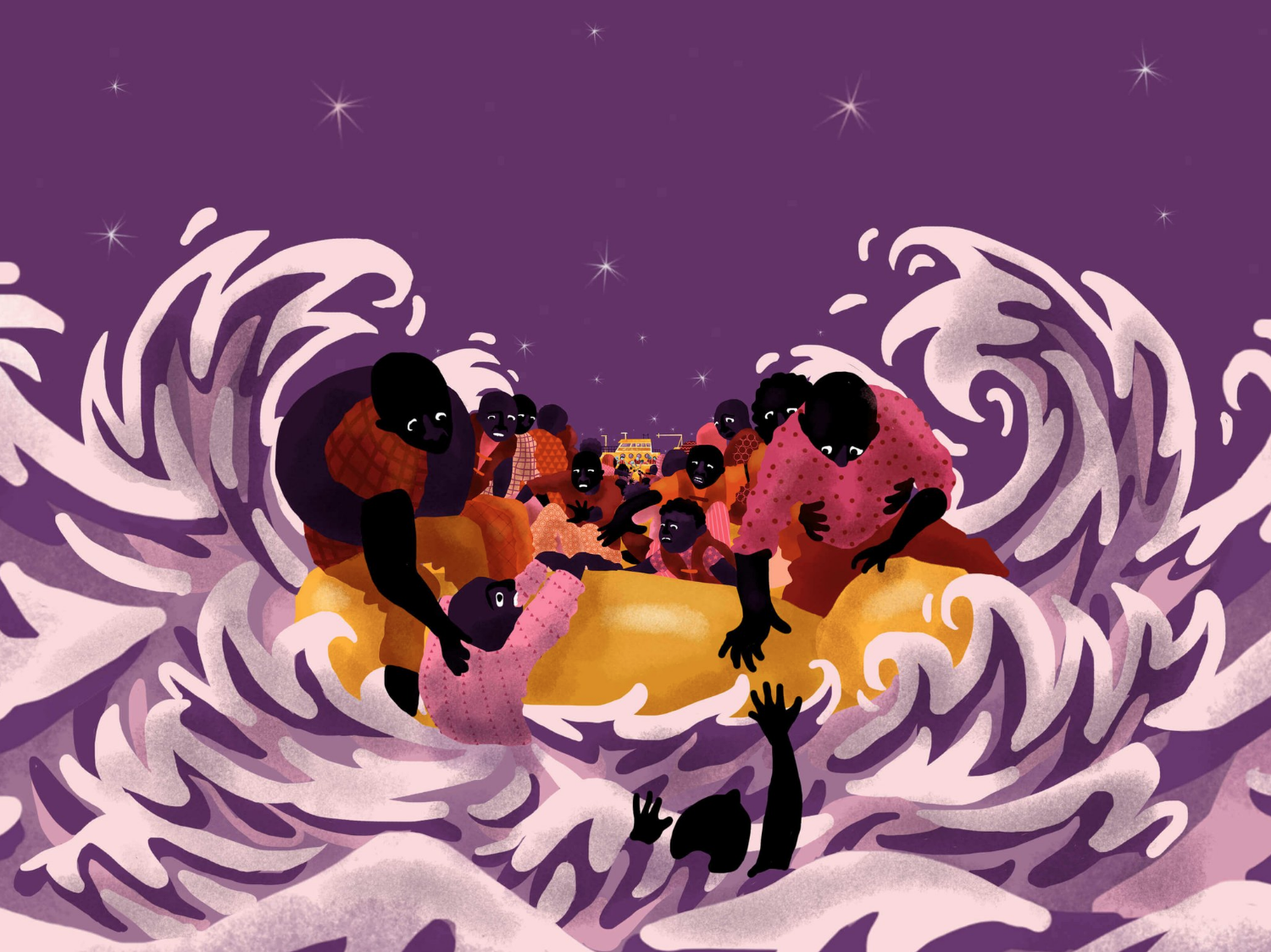
For the past year Professor Heaven Crawley, the educational team at PositiveNegatives and schoolteachers in east London have developed learning tools for bringing academic research into secondary schools. Based on MEDMIG, a research project led by Professor Crawley and funded by the ESRC examining the journeys, motivations and aspirations of people arriving by sea and overland in Italy, Greece, Malta and Turkey in late 2015 and early 2016, the Voices of Migration resources provide access to a real-life data set on refugee journeys in the Mediterranean to develop students’ big data skills.
As Jess, the Assistant Headteacher who co-produced this project, explains:
This was, for me, an important opportunity for students to see how the things we teach in maths classes relate to real life.
When piloting these with my own KS4 class in late 2019, one Year 10 student remarked how the topic of migration ‘is a story that just isn’t been told enough’.
Others reflected on how different these lessons were, as they used their maths skills to tackle real-world issues.
In pilot sessions, Jess encouraged students to go beyond the kinds of narratives surrounding refugees and migrants which often dominate newspaper headlines. Her classes prompted learners to ask their own questions of this data set and seek their own answers. These sessions also introduced them to ‘North Star Fading’ a PositiveNegatives’ award-nominated animation illustrated by artist Karrie Fransman and based on the testimonies of four Eritrean refugees. After watching the animation and interrogating the data, students could reach their own, informed decisions and display their data findings creatively using visual infographic posters.
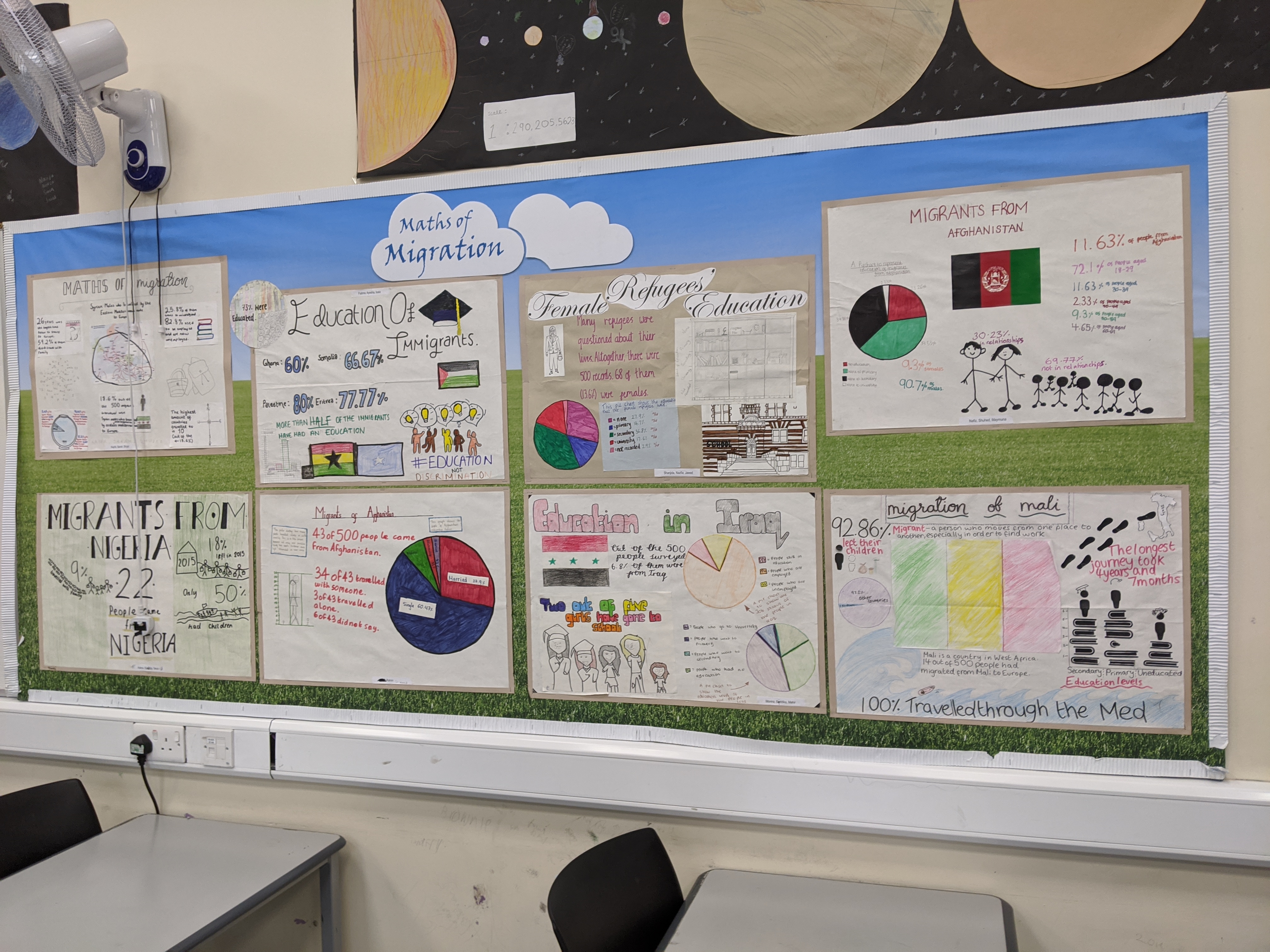
This initial set of lesson plans have been downloaded by over 1.5K educators on TES, and shared directly with over 40 teachers in CPD and events. These resources and training days respond to the findings, outlined in a recent report from the Runnymede Trust, that 78% of teachers in Britain want greater support for teaching migration.
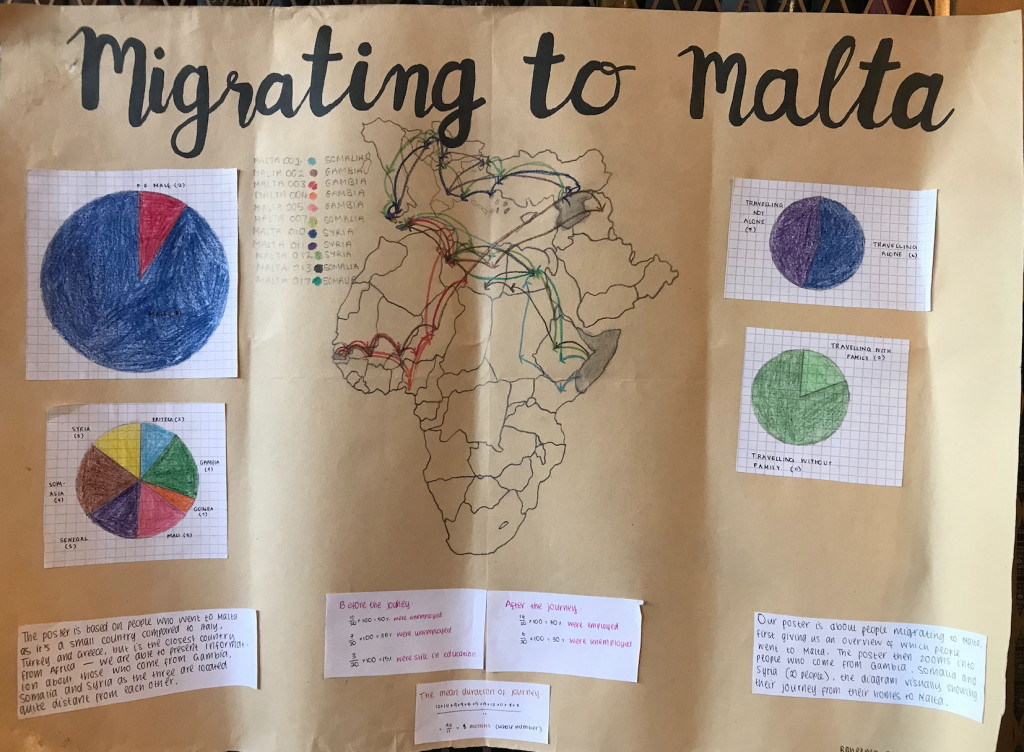
Building on the success of our earlier resources,‘Voices of Migration’ will work with FutureLearn and the MIDEQ Hub, a new project led by Professor Crawley, to provide online learning for teachers’ seeking support with teaching on migration issues. This online learning platform has learners based in every country across the globe. It promotes the values of co-production and social learning which underpin the work of both PositiveNegatives and CTPSR, and makes quality educational resources available to all. As many of us have been abruptly made to adapt to new ways of teaching and learning, we are determined to contribute free, educational tools that can be used by teachers across the world.
As Professor Crawley reminds us, the current pandemic has laid bare structural and systemic inequalities that have left many refugee and migrant communities without a safe home to shelter within. In this context, online learning offers an important means for learners to critically engage with the experiences of displaced peoples across the globe. As we make permanent alterations to the way we teach and learn, it remains imperative that we listen to voices of migration and act to imagine better futures for all.
Life on the Move, our co-produced stop motion animation illustrating complex research on global migration won ‘best social media short’ at the AHRC Research in Film Awards.
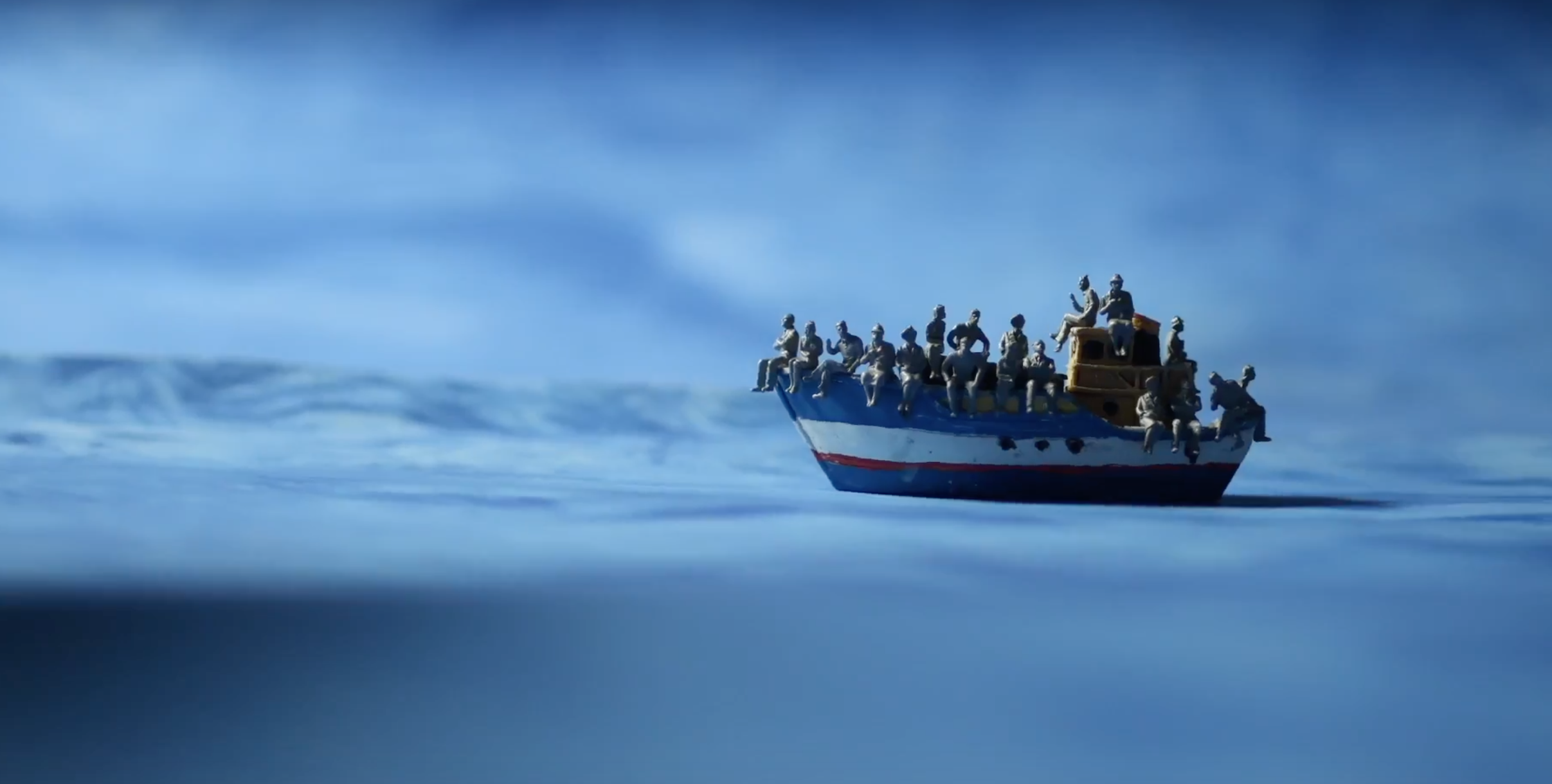
Two of PositiveNegatives’ co-produced films (North Star Fading and Life on the Move) were nominated for the 2019 awards.
Members of the PositiveNegatives team headed to an awards ceremony at the BFI (British Film Institute) Southbank for the big announcement on 12th November 2019.
The Research in Film Awards (RIFA) celebrate the best in academic filmmaking. Their aim is to inspire researchers from across the UK to bring their work to the wider world.

In 2019 there were five RIFA categories and PositiveNegatives are delighted that two of our co-produced films appeared in three categories. They are:
- Life on the Move, winner of ‘Best Social Media Short’
- Life on the Move, nominated for ‘Inspiration Award’
- North Star Fading, nominated for ‘Inspiration Award’
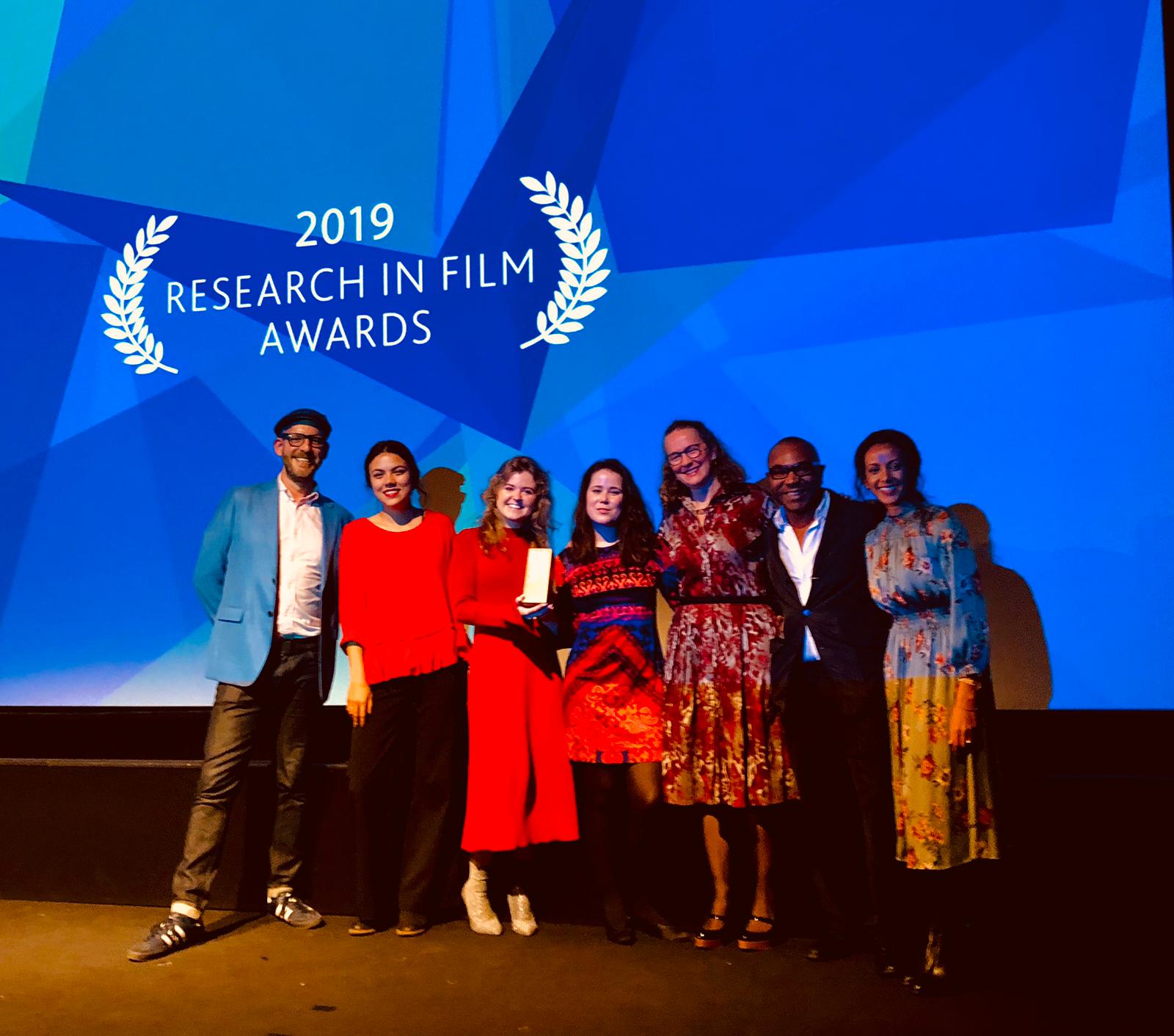
Life on the Move explores the many reasons why people choose to migrate and is based on research, partly carried out by the PositiveNegatives team, in the Horn of Africa. The film was a collaborative production, involving multi award-winning film maker Osbert Parker, the Migration Leadership Team (LIDC-MLT), PositiveNegatives, artist and graphic novelist Karrie Fransman with field work facilitated by the International Organisation for Migration.
North Star Fading is a zoom animation inspired by the testimonies of Eritrean refugees produced by PositiveNegatives and illustrated by Karrie Fransman.
Alongside our own entries are a whole host of exciting films, all of which you can read about and watch here.
“ It was clear I had to find simple, but imaginative ways to bring these true stories to life in surprising ways that allowed viewers to emotionally connect with personal experiences without revealing people’s identities, especially when filming migrants in the Horn of Africa was not a option for several reasons. Animated characters, was the perfect choice to protect anonymity and focus audience attention on the message and heart of the stories.”
– Osbert Parker on creating Life on the Move
The awards ceremony was attended by members of the press, academics, film industry professionals, and the cast and crew behind the 25 films that were shortlisted.
As winners in our category, PositiveNegatives were presented with an award and receive £2,000 prize money to put towards our future work.
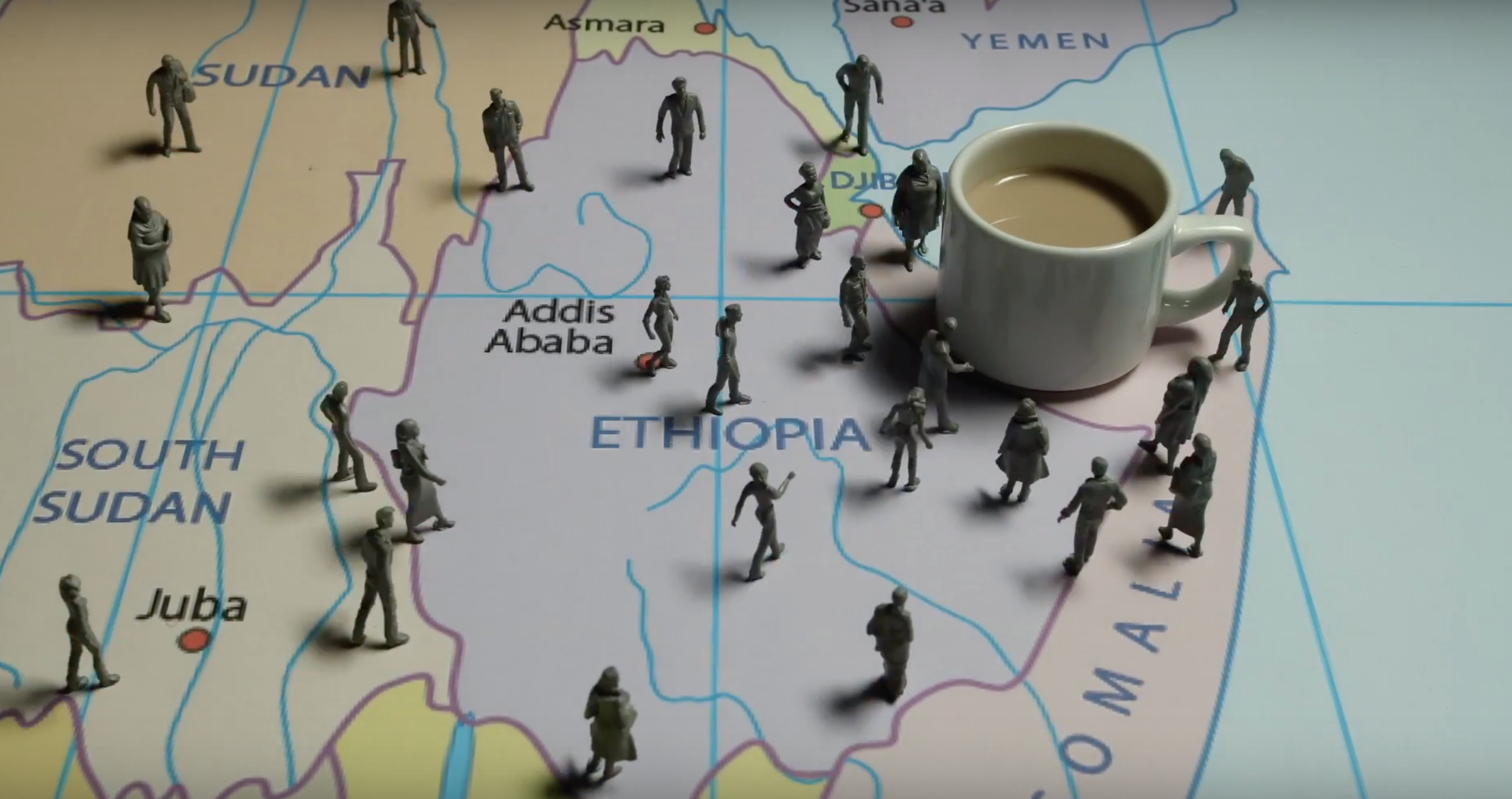
About our Collaborators
The (LIDC-MLT) London International Development Centre Migration Leadership Team is leading a series of global conversations with academics, policy and practice experts, artists and migrants. They are funded by the UK Economic and Social Research Council (ESRC) and Arts and Humanities Research Council (AHRC) to develop a shared and participatory global strategy for identifying and supporting migration research.
Karrie Fransman is a comic creator whose work has been published in The Guardian, The Times, Time Out, The Telegraph, BBC, The New Statesman and by The Arts Council. She is the author of two graphic novels ‘The House That Groaned’ and the award winning ‘Death of the Artist’ along with an award-winning comic, ‘Over, Under, Sideways, Down’ about an Iranian teenage refugee, for The British Red Cross.
Osbert Parker is a three time BAFTA nominated director and is perhaps best known for his signature style of using cut-out animation mixed with live action to create one-of-a-kind imaginary landscapes within commercials and short films.
Contact
If you would like further information please contact:
Emily Oliver, Managing Director, [email protected] Emma Parker, Communications Manager, [email protected]
